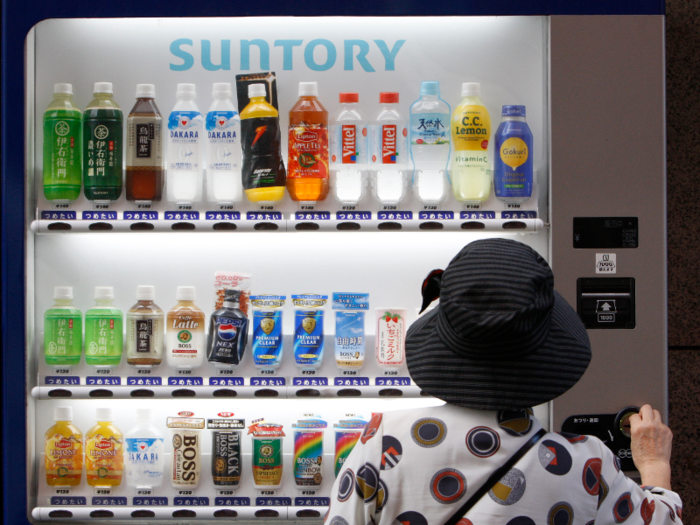
Japan's declining birthrate, aging population, and lack of immigration have contributed to make labor both scarce and costly, according to William A. McEachern, an economics professor at the University of Connecticut.
In his 2008 book on macroeconomics, McEachern points to Japan's vending machines as a solution to this problem, by eliminating the need for sales clerks.
Robert Parry, an economics lecturer at Japan's Kobe University, also pointed to high labor costs as a reason Japanese retailers have so enthusiastically embraced vending machines in a 1998 essay on the subject.
"With spectacular postwar economic growth, labor costs in Japan sky-rocketed ... Vending machines need only a periodic visit from the operator to replenish the supplies and empty the cash," wrote Parry.

With a population of 127 million people in a country roughly the size of California, Japan is one of the most population-dense countries in the world, particularly when you consider that about 75% of Japan is made up of mountains.
93 percent of the Japanese population lives in cities.
The population density has unsurprisingly led to high real estate prices for decades, forcing city-dwellers to live in apartments that would make New York apartments feel spacious. Though urban land prices dropped during Japan’s economic decline in the 1990s, they’ve gone back up since.
High population density and high real-estate prices has meant that Japanese people don’t have a lot of room to store consumer goods and that Japanese companies would rather stick a vending machine on a street than open up a retail store.
“Vending machines produce more revenue from each square meter of scarce land than a retail store can,” Parry concluded.

Japan has long been known for its exceptionally low homicide rate, but that’s not the only crime statistic in which the country excels. According to a United Nations 2010 crime report, Japan ranks as having one of the lowest robbery rates in the world.
While there has been some debate over why Japan’s crime rate is so low, one thing that is readily obvious is that vandalism and property crime are rare. According to the Japan National Tourism Organization, vending machines are “seldom broken or stolen,” despite having tens of thousands yen inside and being frequently housed in dark alleyways or uncrowded streets.
Comparatively, in the US, as Parry writes, “American vending machine companies don’t even consider operating stand-alone, street-side units” due to fears of vandalism and property crime.
In Japan, street-side units are the norm. It doesn't hurt that many vending machines have cameras installed and a direct line to police if any irregularities are reported, like a machine being pried open, according to The Japan Times.

If there's one other aspect of Japanese culture that stuck out to me, it was a heavy reliance on cash.
In the US, I use debit and credit cards for almost every purchase besides visiting a hole-in-the-wall cash-only restaurants. In Tokyo, not even the train stations accepted credit cards to purchase subway tickets. Major chains took credit cards, but lots of stores did not.
The practical effect of this is that you are always carrying around a considerable amount of cash, and not just paper bills, but coins. Coins in Japan come in high denominations like 50 yen, 100 yen and 500 yen ($1 = 112 yen). By the end of my trip, I had fashioned a makeshift coin purse to corral the money weighing down my pockets.
As I discovered, dropping a single coin into a vending machine for a drink was a convenient and useful way to get rid of the change jangling around in my pocket.

Japanese culture is obsessed with automation and robots, journalist Tsutomu Washizu explained to The Japan Times in 2007.
Washizu, who wrote a book on the history of vending machines in Japan, credits this fascination as a main reason why the machines are so popular.
“There is no other country that has so much automation. The Japanese people have a high regard for, and trust in, automated systems,” Washizu said.

 Global stocks rally even as Sensex, Nifty fall sharply on Friday
Global stocks rally even as Sensex, Nifty fall sharply on Friday
 In second consecutive week of decline, forex kitty drops $2.28 bn to $640.33 bn
In second consecutive week of decline, forex kitty drops $2.28 bn to $640.33 bn
 SBI Life Q4 profit rises 4% to ₹811 crore
SBI Life Q4 profit rises 4% to ₹811 crore

Copyright © 2024. Times Internet Limited. All rights reserved.For reprint rights. Times Syndication Service.